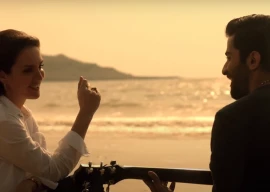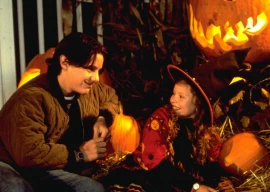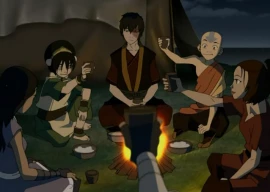1708929965-0/Screenshot-(664)1708929965-0.png)
‘Taxali Gate’ review: Solid lead performances provide balm for a film bruised by technical errors
Ayesha Omar, Mehar Bano shine in Abu Aleeha’s drama tackling consent and stigma
KARACHI:
Taxali Gate has many ambitions: it has to flaunt its politics, preach to its audience about consent and womanhood, pass for a rape-revenge film while aiming for a courtroom drama. Top this all with characters who want to save themselves by narrating their complexity instead of growing into it.
Director Abu Aleeha’s latest is able to accommodate all the above elements in a span of filmic three days that run on screen for roughly 95 minutes. However, the end product is an often confused rendering in a race against itself. It’s not only that the film is fraught with glaring technical errors but such rudimentary faults will end up taking a lot of space for well-meaning critics who would much rather discuss the streets and tales of Taxali Gate itself.
The case of sex work
1708931043-0/Screenshot-(672)1708931043-0.png)
Fictionalised portrayals of sex work, admittedly few in Pakistan, are always tricky waters to traverse. It’s rare to stumble upon narrativisation that does not crave victims or locate NGOised figures of empowerment. Saadat Hasan Manto’s Kali Shalwar and Shyam Benegal’s Mandi are two cases in point that take neither martyrs nor heroes and let women be women first.
Lahore’s historic red light district, Taxali Gate is better known as Heera Mandi as the film’s opening voiceover recounts. Thereon, the camera follows Shafiq (Yasir Hussain) through the infamous streets before he is introduced to the audience as a lovestruck pimp gathering clients for the sharp-witted Muskan (Ayesha Omar).
Enter caste
1708930926-0/Screenshot-(666)1708930926-0.png)
Aleeha’s most significant departure from the usual renditions of Heera Mandi would be to not premise all suffering on the prostitute. Enter Shafiq’s niece, Zainab (Mehar Bano) who is gang raped by her boyfriend and his friend (Umar Alam, Sheheryar Cheema) and must navigate the justice machinery as a lower-caste plaintiff.
Her father, Meeda/Abdul Hameed (Nayyer Ejaz), is an entertainer belonging to the Kanjar caste and no match for the rapist, shielded by his father Chaudhry Sheheryar’s privilege and pride. Despite the small odds of the family succeeding in court, as bluntly pointed out by Zainab’s attorney (Iffat Omar), legal proceedings commence within three days of the crime.
Unlike most courtroom dramas, a Pakistani legal battle hardly ever induces a will-they-won’t-they anticipation among audiences on the other end of the screen. It is written from the outset that a rape survivor’s victory will be nothing short of monumental and extraordinary. Practical on this account, Aleeha never offers any false hopes even when it largely seems that he’s the one putting the low-caste family through the system just to humiliate them, a sentiment that Zainab holds against Meeda.
In the courtroom
1708930925-2/Screenshot-(668)1708930925-2.png)
Aleeha might not take any visual liberties to exploit Zainab’s rape or Muskan’s business as usual but the courtroom’s incessant cross-questioning makes up for it under the guise of depicting reality. The exploits, in this case, aren’t one of pure sensationalism but a poorly acted and executed sequence that follows Chaudhry’s attorney (Alyy Khan) mocking the defendants in the presence of a blatantly biased judge just to push the film forward.
Unfortunately, the courtroom scenes are perhaps the only part of the film that feels complete and coherent if only to allow the actors to become heroes with grand speeches better suited to the cinema’s audience. Alyy Khan as the defence lawyer fashions his assault on #Me Too and ‘Mera Jism Meri Marzi’ with fervour only to fall dramatically silent upon a piquant lecture from Muskan.
More incredibly, the system that puts Zainab, Meeda, Shafiq and Muskan at a disadvantage via both caste and profession exists as little beyond poorly-enacted comic relief. While ‘filler’ scenes permeate the entire film and suggest bad editing throughout, one overt mischance is a telephonic conversation between the judge (Khaled Anam) and his wife, to prove him nonserious (with undertones of misogyny).
All the blind spots
1708930926-1/Screenshot-(667)1708930926-1.png)
Aleeha’s film is only made digestible by a solid performance by the four lead actors and a fine plot twist and ending, despite the filmmaking team’s best efforts to self-sabotage. The blind spots in writing are on many occasions made all the more conspicuous by editing scenes together with amateur fade-to-blacks. Things happen throughout the film now and then for no reason and to no conclusion, the latter likely resulted from a lack of B-roll.
There are many faults to protest on the technical front such as the use of a shaky cam where it appears more like a mistake than an artistic choice or the recurring delays in focus pulling. Neither does it take a trained ear to spot the patchy sound design which steadily robs the film of its momentum long before Eva B’s energetic Mera Haq Kidhar Hai can invite the climax.
Mostly, Taxali Gate is tormented by a drive to be everything. The cynical lawyer has her moments of hope; the ruthless cop (Iftekhar Thakur) who readily dismissed Zainab and Meeda breaks character and defends a stray woman’s honour. While well-intentioned, these quirks in lieu of character complexity are every bit as contrived as making a film is but where editing is supposed to conceal the cracks, Abu Aleeha’s Taxali Gate stands empty-handed.
1708931074-0/Screenshot-(675)1708931074-0.png)
Have something to add to the story? Share it in the comments below.


1730355716-0/Copy-of-Untitled-(59)1730355716-0-270x192.webp)
1730276684-0/Copy-of-Untitled-(55)1730276684-0-270x192.webp)
1730095495-1/WhatsApp-Image-2024-10-28-at-11-04-18-(1)1730095495-1-270x192.webp)










COMMENTS
Comments are moderated and generally will be posted if they are on-topic and not abusive.
For more information, please see our Comments FAQ